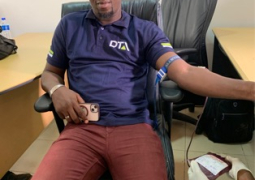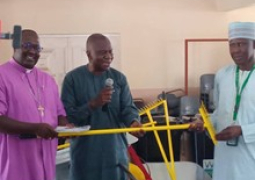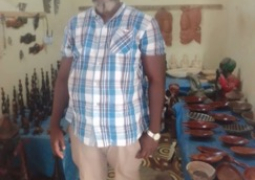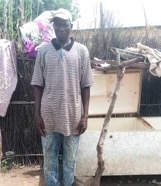
The programme is designed to promote continuity and harmonisation with other programs, by expanding an existing package of cash transfers with Social and Behavioural Change Communication (SBCC) managed by NaNA and partners.
The project, administered by NaNA, Directorate of Social Welfare and Department of Community Development, is being implemented in West Coast, Central River, North Bank, Lover River and Upper River Regions, where a total of 15,606 extremely poor households are assisted with a cash amount of D3000 every two months during the seven rounds of payment.
For Sambou Touray, a native of Kuwonkunding village in Wuli West District, Upper River Region and a beneficiary of the ‘Nafa’ Program, the project is a blessing in disguise, as the project has helped him start a business to be able to provide daily fish money for his family.
Touray, a fish monger, who started the business after benefiting from the ‘Nafa’ Program, explained further that he entirely depended on farming prior to the coming of the project.
“Most of the time, I usually finish consuming my harvest after four months. After receiving my household’s Cash Transfer I divided it and spent half to buy a bag of rice for my family consumption and the other half to purchase fish and resell it.”
He added; “The fish business is going on smoothly because most of the time there is fish scarcity in the area. So, I usually, resell what I purchase within two or three days and call my supplier to bring me more fish again.” he further explained.
According to him, prior to the coming of the project, even providing fish money for his family was a challenge for him, but that is a thing of the past now.
Touray thanked World Bank and The Gambia Government for funding the project.
The Project Development Objective (PDO) is to improve the coordination of social assistance activities, provide temporary social assistance support to rural households in the wake of COVID-19, and increase inclusion of the extreme poor in the ‘Nafa’ Program. The beneficiary selection was done using a Proxy-Means Test (PMT), which was followed by a community validation exercise in the poorest 20 districts of The Gambia. The regular revenue provided to extremely poor households is aimed at increasing short-term consumption of essential goods and enabling longer-term investments in human and productive capital.
Tailored SBCC provides information to beneficiaries and non-beneficiaries to encourage investments that can bolster human capital especially maternal and child health and nutrition, adolescence education and family planning; parenting and prevention of gender-based violence; and productive capital especially savings, entrepreneurship and agriculture to break the inter-generational cycle of poverty. In the three piloted districts, a total of Two Thousand, Seven Hundred and Seventy (2,770) beneficiary households each received D3000 every two months during the seven rounds of payment.
Also speaking, Samba Bah, Governor of Upper River Region, expressed satisfaction with the way and manner in which the cash transfer is being carried out by implementing partners, saying this is because an assessment was done to identify extremely poor households.
The Cash Transfer, he added, has positively impacted the lives and livelihoods of the beneficiaries.
“And beneficiaries do not only stop at receiving the money, but are putting it into good use with some of them investing in businesses and other ventures.”
The project, Governor Bah alluded to has come to transform the lives of many households in his region and other parts of the country and thus appealed to the World Bank and The Gambia Government to expand the project to other districts across the country.
Abdou Aziz Ceesay, Director of Social and Behavioral Change Communication at the National Nutrition Agency, said as a nutrition agency responsible for all nutrition and nutrition-related activities in the country, the success registered by the project is a dream come true for them.
“If you uplift the extremely poor from poverty it improves under-nutrition, thereby lifting households from poverty and building their resilience improve their health and nutritional status as well.”
Ceesay indicated that ‘if the trend of success registered by beneficiaries continues we will drastically reduce malnutrition and contribute to socio-economic development of the country’, adding that ‘the reason why the cash transfer is accompanied with Social and Behavioral Change Communication is to ensure beneficiaries invest part of the money they receive to ensure to be able to sustain themselves at the end of the project.’
Read Other Articles In National News
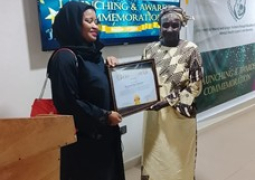
Pathmothers marks first anniversary with launching awards commemoration
Dec 2, 2025, 12:17 PM
